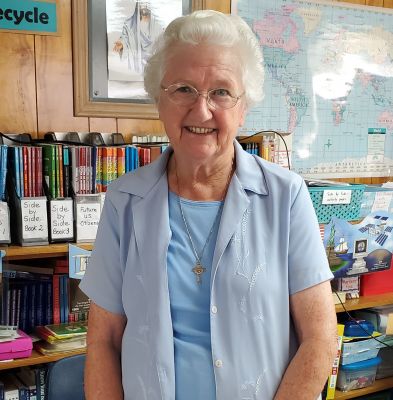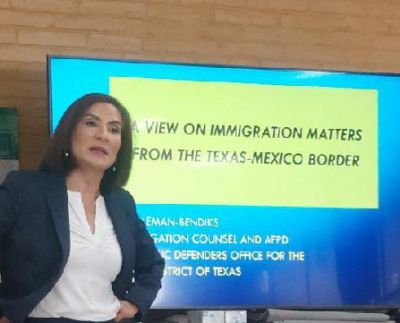Two of the most memorable experiences I have had while living in the Rio Grande Valley of Texas were having the opportunity to assist Sister Thérèse Cunningham with ESL lessons at La Posada Providencia and learning from retired public defender Azalea Aleman-Bendiks. La Posada Providencia is an emergency shelter for women, men, and families fleeing their home countries because of political tyranny, natural disasters, and other life-threatening situations. Azalea graduated from Harvard University in 1991 and has devoted her life to serving the Texas community since then. Furthermore, Azalea is from Brownsville, Texas, and after working in other parts of law she felt compelled to start working more closely with immigration. Azalea explained to us that the atmosphere in Texas is different from other states she has visited in the sense that not all states have police officers asking people for their papers and that there are no checkpoints throughout every state. Something else she mentioned is that saw firsthand the inconsistency between the written law and what was carried out. For example the judges are supposed to thoroughly examine each case but instead are already releasing immigrants before they have even had a chance to plead their case. Border patrol is another group of people that has inconsistency in the sense that it is the law for people to have the opportunity to seek for asylum when immigrants turn themselves in to border patrol, but what is happening in reality is that border patrol sometimes simply deports asylum seekers back to where they came from. Both Sister Thérèse and Azalea have taught me valuable information that I did not know before coming to the Rio Grande Valley of Texas.
One of the unique experiences that I got to live was having the opportunity to help immigrants learn basic necessities along with Sister Thérèse. Sister has been teaching at La Posada for the past sixteen years and told me that she enjoys the work that she does because she knows that God put her in their hands. An interesting fact is that she came all the way from Ireland to come help immigrants. I feel like this is a wholesome act on her part because she left her family behind knowing that she would be helping individuals who also leave their family behind in the hopes of a better life. From my personal experience, my parents left their family behind in hopes of providing their children with a better future. For example, my parents want my siblings and I to have the opportunity for us to find a career in which we are passionate about. In my case, I felt a calling towards the nursing profession and my parents have been supportive of my decision.
One of the things I helped Sister teach was knowing the alphabet so that the guests are able to spell out their name in case that people do not understand their English. Another interesting thing that I got to teach the guests at La Posada was how to count money in order for them to be able to purchase goods. Having the opportunity to teach at La Posada gave me a sense of fulfillment because I know that teaching these immigrants these basic necessities will help them be more self-sufficient.
When Azalea came to talk to our group, she taught us that immigration matters along the Texas-Mexican border. She first went on to describe how immigrants are not viewed as human beings, but rather viewed as objects. This is mostly seen in situations where asylum seekers turn themselves in to border patrol in the hopes of receiving help, but rather receive mistreatment and a lack of empathy. Another thing she explained was how politics has become bigger than humanity in regards to immigration. Nowadays, more people are worried about finding laws that prevent immigrants from seeking asylum rather than helping them escape the cruel reality of their home country. I feel like if judges were to have more empathy towards immigrants and their reasons for leaving their home country then there would be more asylums granted. Judges go into the hearings already in the mindset of not wanting to listen to people’s stories, starting off by referring to human beings by their A-number (an identification number assigned by the government). In Goshen I know of people who have to work low paying jobs because of their legal status and therefore have limited options. Moreover, because many immigrants do not have the “correct” documentation they can not apply for higher paying jobs which often require proof of legal residency.
Something I knew before hearing Azalea’s presentation was the fact that the government is separating children from their parents at the border. On the other hand, I did not know that the children being separated from their parents were not being properly identified and therefore it is difficult for parents to reunite with their children; it was devastating to hear that these children range from infants to teenagers. I can’t imagine what it is like for a toddler who is fully dependent on their parents to be willing to show trust towards strangers that were responsible for separating them from their parents. Furthermore, hearing this made me think of what it would be like to be separated from my parents at a young age and the trauma that I would have to carry with me for the rest of my life. Knowing that the people I care the most about would be apart from me in difficult situations, such as staying alone in the detention camps without having the support of anyone, makes me feel downhearted.
From these opportunities to engage with local people working with immigrants, I have gained information and experiences that will create more empathy for my patients in my nursing career and impact the ways I see myself engaging with my community in the future.
– Avilene Evangelista, Goshen College Class ’24 Nursing major







